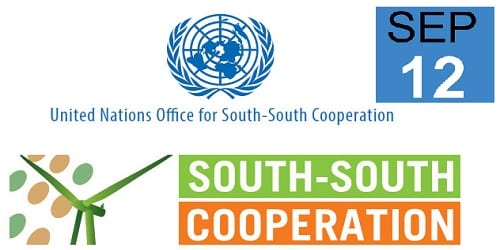The International Day for South-South Cooperation was observed on 12 September 2019 by United Nations (UN) aims to raise awareness of the UN’s efforts to work on technical cooperation among developing countries. The day also celebrates the political, social and economical developments made by regions and countries in the south in recent years. Key points:
Key points:
i. The theme for the year 2019 is “South-South Cooperation is From Commitment to Action — Follow up to Buenos Aires Plan of Action+40”. The theme focuses on Promoting and implementing the commitments adopted in the Second High-level United Nations Conference on South-South Cooperation (BAPA+40) was held in Buenos Aires, Argentina on March 20 to 22, 2019.
ii. In the year 2003, the United Nations(UN) General Assembly declared December 19 as the UN Day for South-South Cooperation(SSC). But the day was fully adopted by the UN on 12 September 2011. It commemorates the day when the UN General Assembly (UNGA) adopted the Buenos Aires Plan of Action (BAPA) in 1978 to promote and implement technical cooperation among developing countries.
South-South Cooperation ‘accelerates’ us toward 2030 goals: UN Chief
On the occasion of International Day for South-South Cooperation (September 12, 2019), The UN Secretary-General, Antonio Guterres stated that cooperation among countries of the global south offers a “unique pathway” that accelerates towards the key 2030 agenda for sustainable development goals(SDG).
i. A total of 2.4 billion people, living in the South, do not have adequate sanitation, while some 840 million are without electricity, and 885 million lack access to clean water.
ii. The UN’s office on the issue (UNOSCC) exemplifying characteristics of effective collaboration by underlining the needs and specific SDGs for southern countries. It also outlines incorporation of Triangular Cooperation, where traditional donor countries and multilateral organizations facilitate South-South initiatives through funding, training, management and technological systems and other forms of support.

